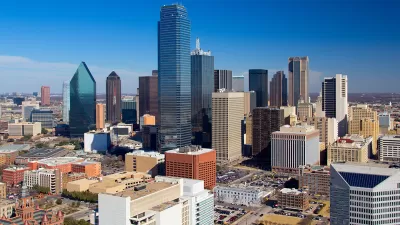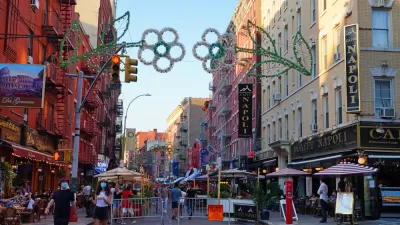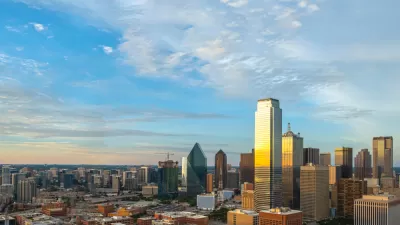The big, contentious question of contemporary downtowns is under consideration in Dallas: Is there too much parking or not enough parking?

Robert Wilonsky recently reported that the city of Dallas is seeking consultants to study Downtown Dallas' parking needs and develop a plan to meet parking demands. According to Wilonsky, "[t]he request for qualifications…blames a lack of parking on some companies choosing to move to the suburbs rather than the city center." The RFQ elaborates on how the rebirth of downtown "into a globally competitive urban center has placed strains on the ability to meet parking demands and expectations, resulting in some desired investment and development choosing to forego downtown Dallas for locations in outlying suburban areas."
The parking plan follows from the update of the Downtown Dallas 360 plan, approved in 2011 and currently amidst an update. Wilonsky notes that the city is also underway with a study examining on-street parking and about to launch another parking study in the Bishop Arts District neighborhood.
Enter Mark Lamster, Dallas Morning News architecture critic, who provides his critical take on the trends favoring parking in downtown: "This is not the best use for such precious spaces with the urban center." Lamster is bluntly skeptical that the city's new study will achieve anything other than more reinforcement for the parking status quo: "What it will do is reinforce the cycle of looping logic that has bred the very problem it would resolve. Because downtown Dallas doesn’t principally have a parking problem. It has a downtown Dallas problem, and the parking situation is only an exacerbating consequence of that reality."
Lamster provides a long list of specific shortcomings in the public realm of downtown to elaborate that point that it will take much more than a parking study to understand parking in Dallas.
Peter Simek follows Lamster's commentary with some of his own, including the additional point that the city's downtown buildings suffer from historically low vacancy rates, which creates a catch-22 of parking demand.
FULL STORY: Dallas is ready to pay someone to find out if the city has enough downtown parking spaces

Alabama: Trump Terminates Settlements for Black Communities Harmed By Raw Sewage
Trump deemed the landmark civil rights agreement “illegal DEI and environmental justice policy.”

Study: Maui’s Plan to Convert Vacation Rentals to Long-Term Housing Could Cause Nearly $1 Billion Economic Loss
The plan would reduce visitor accommodation by 25% resulting in 1,900 jobs lost.

Planetizen Federal Action Tracker
A weekly monitor of how Trump’s orders and actions are impacting planners and planning in America.

Waymo Gets Permission to Map SF’s Market Street
If allowed to operate on the traffic-restricted street, Waymo’s autonomous taxis would have a leg up over ride-hailing competitors — and counter the city’s efforts to grow bike and pedestrian on the thoroughfare.

Parklet Symposium Highlights the Success of Shared Spaces
Parklets got a boost during the Covid-19 pandemic, when the concept was translated to outdoor dining programs that offered restaurants a lifeline during the shutdown.

Federal Homelessness Agency Places Entire Staff on Leave
The U.S. Interagency Council on Homelessness is the only federal agency dedicated to preventing and ending homelessness.
Urban Design for Planners 1: Software Tools
This six-course series explores essential urban design concepts using open source software and equips planners with the tools they need to participate fully in the urban design process.
Planning for Universal Design
Learn the tools for implementing Universal Design in planning regulations.
Caltrans
Smith Gee Studio
Institute for Housing and Urban Development Studies (IHS)
City of Grandview
Harvard GSD Executive Education
Toledo-Lucas County Plan Commissions
Salt Lake City
NYU Wagner Graduate School of Public Service





























